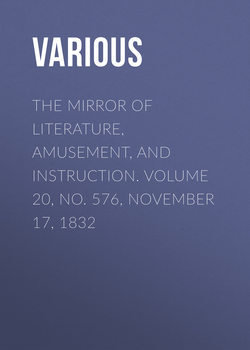Читать книгу The Mirror of Literature, Amusement, and Instruction. Volume 20, No. 576, November 17, 1832 - Various - Страница 2
WINGFIELD MANOR-HOUSE
POSTS FOR THE CONVEYANCE OF LETTERS
ОглавлениеPosts of some kind or other appear to have been in extensive use, and to have been held in high importance, by all civilized nations, from an early period of history to the times we live in. Attempts were at first made to carry on correspondence by the means of pigeons and other birds, and though the attempt did not altogether fail, yet it was never carried into extensive practice, and in the progress of time was totally disused. The first establishment of Posts can be traced to the times of the ancient Persians. The honour of their invention is ascribed to Cyrus. It appears that on his conception of his Scythian expedition, he caused certain Post-houses to be erected on all the principal roads. These houses were a day's journey from each other; and Cyrus employed horsemen to convey the intelligence from the army to the first Post-house, and so to the second and third, till the end of the Post-houses, which was at Susa. The news of his victories was thus conveyed to his people in an almost incredible space of time. The Greeks were also in the possession of regular posts, but we have no data from which we can judge of the manner in which they were conducted, who founded them, or where they were first established.
At Rome, Posts and Post-houses were established, and designated statores and stationes; they were founded by the senate at a very early period of the Republic. They were at first very ill managed, the delivery of the post being extremely irregular, and confined to the great roads; but Augustus extended them throughout all parts of his mighty empire, and issued commands which appointed certain days for the delivery of the posts. At their first establishment the Posts were carried by young men on foot, who were met by others at the appointed post stations, but horses and chariots were substituted in their stead by Augustus.
The earliest institution of Posts in modern times was about the year 807. Charlemagne after he had subjugated to his power Germany, Italy, and a large part of Spain, seeing the inconvenience which the Government suffered from the non-delivery of important despatches from the governors of these distant parts of his dominion, caused Posts to be established at the expense of the people; but like the majority of the wise institutions of this warrior-statesman, shortly after his decease, they were discontinued, and till a long period after no traces are to be found of similar establishments. It is highly probable that they were re-instituted in the year 1484, by Louis XI. who employed in this department 230 couriers and messengers. Succeeding kings instituted officers expressly to superintend the Posts, as great abuses had crept in from time to time, but the multiplicity of the new made officers, and the frequent changes in the organization of the Post Office, kept the public from putting any faith in it, and it had almost ceased to exist when some spirited official men by organizing a new plan, and by giving a certainty to the public of the delivery of their letters, saved it from discontinuance.
From France the institution gradually spread over the other countries of Europe. In Germany, which country was one of the first to adopt the system of the French Posts were established through the influence and at the expense of Count Taxis, who was denominated "the Patriot." The wishes of the people caught the heart of the Emperor Matthias, who to reward Taxis for his public spirit, gave him the office of Post-master, and assigned it to his descendants for ever.
In England Posts appear to have been established as early as the reign of Edward III.; but the records of them handed down to us are obscure and uncertain. In the reign of Edward VI. they were however in full vigour: an Act of Parliament passed in 1548, which we have now before us, fixes the rate of postage at one penny per mile. The Posts here referred to were only used on important occasions. James I. erected a Post Office, which he placed under the control of Matthew de Questor; the office was claimed by Lord Stanhope, whose claim, however, was disallowed; but owing to the detection of de Questor in some mal-practices, the office was given and confirmed to W. Frizee and Thos. Witherings. In the year 1635, Charles I. erected a letter-office for England and Scotland, which he placed under the direction of the before-mentioned Thomas Witherings, who conducted it honourably, but was afterwards superseded for supposed abuses—a charge which was never proved. The rate paid about that time was "twopence for a letter, from 30 to 140 miles." The Posts then established were shortly after extended to the principal roads of England, and were from time to time increased, till they were spread over the kingdom, to the great benefit of a commercial people.
The Post Office forms one of the chief branches of the revenue, and the total received for the conveyance of letters during the last quarter amounted to 33,000l.
The present arrangements of the Post Office, at least as far as they are known, the certainty of the transmission of letters, the economy with which it is conducted, are the theme of admiration by the nation at large, and more particularly by foreigners.
E.J.H.
